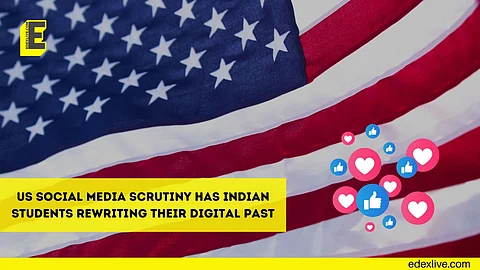

The notification sound that once brought excitement now carries an undertone of anxiety. For thousands of Indian students preparing to pursue higher education in the United States (US), every social media interaction has become a calculated decision, each post a potential gateway or barrier to their academic aspirations.
The landscape shifted dramatically when the US government intensified comprehensive social media vetting for all international student visa applicants, halting the visa process globally while preparing to enforce stricter scrutiny of social media activity.
The developing situation reveals a broader shift in how young Indians engage with digital platforms, caught between authentic expression and strategic self-curation.
Students are conducting what experts call “digital cleanses,” methodically reviewing years of casual likes, shares, or comments made without political intent that could be misinterpreted through the lens of American interests.
A PhD student at Jawaharlal Nehru University (JNU) exemplifies this new reality, he wiped his entire social media presence after a US university paused his post-doctoral appointment, removing pro-Palestine content, casualty figures from Gaza, and articles on rising authoritarianism. His rationale was, “You don't know what will offend them.”
This heightened scrutiny of digital presence reflects broader anxieties stemming from recent campus demonstrations and political tensions that have made immigration authorities particularly vigilant about applicants’ online personas.
Manisha Zaveri from Career Mosaic, who has observed these shifts firsthand, describes students as “increasingly uncertain and cautious” about managing their digital presence. The response she witnesses goes beyond mere deletion, it marks a shift where social media is no longer peripheral, but a deliberate and strategic extension of a student’s academic and professional narrative.
“Just like you would carefully build your resume for the admissions process, your digital presence should also reflect a respectful and authentic version of yourself,” she explains.
The real challenge, Zaveri notes, is striking a balance.
On one hand, mass deletion of online content can raise red flags during visa scrutiny. On the other, maintaining a politically engaged digital presence, however well-intentioned, may invite scrutiny.
Instead of reacting out of fear, she advocates for a thoughtful middle ground: intentional curation over complete erasure, encouraging students to reflect their interests and involvement rather than impulsive or divisive opinions.
This shift has prompted educational consultancies to fundamentally restructure their counselling programs. Career Mosaic now conducts weekly pre-departure sessions covering everything from visa interview strategies to digital risk management.
The core message is that students heading to the US for education must stay focused on their academic goals while respecting the host country’s cultural and political context, both in online and offline spaces.
The personal impact of this heightened scrutiny becomes clear in conversations with current applicants.
An undergraduate from Mumbai, awaiting her visa interview to join a US university this fall, describes the constant vigilance now required. “I’ve always kept my social media clean, but now I double-check everything I post,” she says. “I’ve heard stories of students being questioned over harmless posts, and that makes it real.”
The anxiety extends beyond current applicants to future ones. A final-year engineering student in Bangalore, planning to apply for Fall 2026, has already begun curating his digital footprint despite being more than a year away from submission.
“It’s no longer just about grades and scores,” he observes. “It’s about how you present yourself as a responsible, aware individual.” The uncertainty has even prompted him to consider deferring his plans to observe how policies evolve.
Critics argue that requiring students to sanitise their online presence years in advance of the application represents a form of pre-emptive self-censorship.
Zaveri frames it differently, calling it "digital maturity,” a recognition that online behaviour now carries real world consequences.
The artificial intelligence (AI) systems now monitoring social media activity add another layer of complexity. Unlike human reviewers who might understand cultural context or satirical intent, algorithmic assessment may interpret content with stark literalism.
Despite these challenges, the appeal of American higher education remains strong. The students and counsellor interviewed emphasise that academic excellence and global recognition continue to drive applications.
The US education system’s reputation for educational excellence and cutting-edge research ensures sustained interest, even as immigration policies tighten.
The temporary pause in visa interviews has created additional uncertainty, with thousands of students in limbo. Zaveri expects interviews to resume within weeks but suggests the delay may reflect efforts to establish clearer guidelines around social media evaluation.
As a new era of digital scrutiny unfolds in the American academic space for international students, Indian applicants find themselves pioneers navigating the intersection of authentic social media presence and educational aspiration.
Whether this represents a temporary policy adjustment or a permanent shift in how educational institutions evaluate international applicants remains to be seen.
